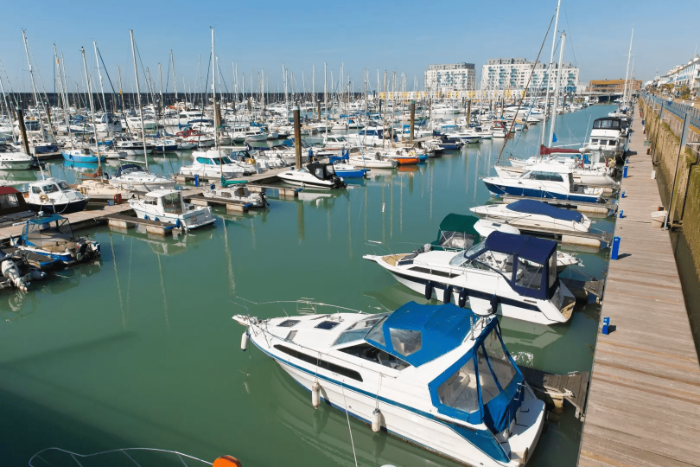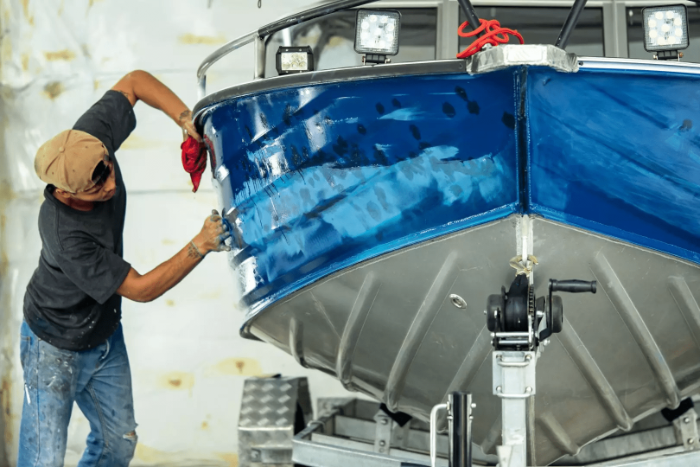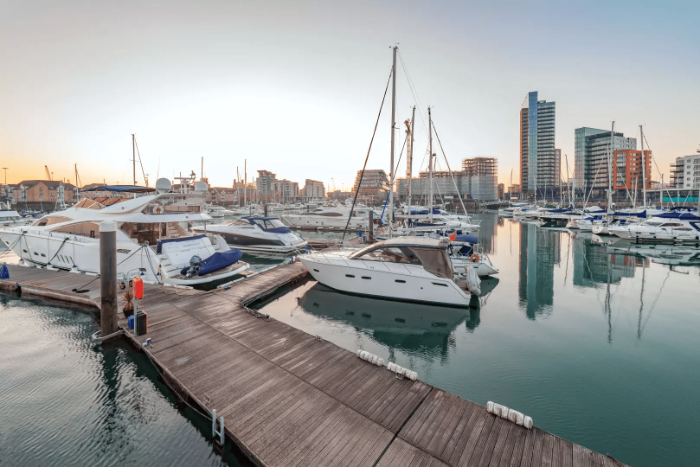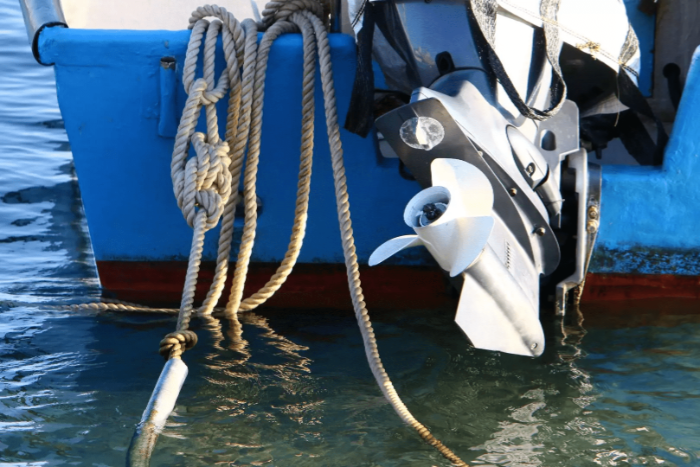Wondering how to protect your investment before buying a boat? This article explores the importance and process of a pre-purchase boat survey, highlighting how it helps buyers avoid costly surprises and provides crucial data for insurance purposes.
What Is a Pre-Purchase Boat Survey?
Getting a pre-purchase boat survey might be likened to a house inspection before purchasing it; it's an in-depth assessment of both the condition and the value of the boat prior to purchasing it. This survey clears the way for the potential buyer to fully understand the condition, the equipment, and the worth of a boat, thereby forestalling any expensive surprises that might come up later.
Using maritime terms, a 'survey' is understood as a complete examination of the vessel performed by a marine surveyor who possesses both training and certification. Typically, the answer to the question of the need for a survey for a boat is affirmative, particularly for boats of older models.
Many insurance companies insist on having a full survey conducted on a boat if it is above a certain age. The primary objective of carrying out a boat survey isn't just to establish a market value for the boat, but also to pinpoint any potential safety threats or structural defects.
Any issues noticed could inform the buyer's decision on negotiating an appropriate selling price or require the seller to rectify them. In this regard, conducting a survey is a useful step because the buyer doesn't end up overpaying and it helps the seller quicken the sale process.
What Should I Expect from My Boat Survey?
A boat survey is a service that is carried out by a trained marine surveyor. This service involves an extensive evaluation of your boat's structural robustness, safety measures, and various additional equipment installed, to ensure everything is in optimum working condition. The entire process, from beginning to end, involves checking numerous elements of your boat.
Hull and Electrical systems: The marine surveyor starts off by inspecting the hull: an essential structural component of the boat that ensures its seaworthiness. The electrical systems of the boat are detailed, to make sure they’re all working and adjust efficiently to the boat's operations. This inspection also includes a detailed analysis of the rigging, which is crucial for sailboats as it holds the mast, boom, sails, and other fittings.
Plumbing: Plumbing is another crucial aspect that is thoroughly inspected, to ensure there is no leakage and the fresh and wastewater systems are functioning properly. For a comprehensive assessment, the inspection is not limited to just structural inspection but also includes testing the boat's performance on the water.
engine and steering systems: Here, both engine and steering systems are primarily checked to ensure that they are operating at their full capacity. Additionally, all the equipment installed on the boat such as navigation systems, lifesaving equipment, and more are verified for their working condition. A key aspect of the inspection is ensuring the boat's adherence to safety regulations. These regulations are stipulated by the maritime authority and ensure the boat's safety and sea-worthiness.
Documentation: Following the thorough inspection, the marine surveyor will document all the findings in an inclusive report that is handed to you. This report effectively summarises the boat's condition, its estimated market value, and any potential areas that may require repairs or upgrades.
The insights drawn from this survey will help you address any problem areas, increasing the durability and functionality of your boat. Furthermore, they provide your insurance company with a fuller understanding of the risk involved in insuring your boat, proving valuable in determining your insurance premiums.

How Long Does a Boat Survey Last for Insurance?
A boat survey for insurance is a fundamental requirement that usually holds validity for a period of two to three years. This signifies that if you have recently obtained a thorough survey of your boat, the majority of insurance firms will regard this as acceptable for underwriting during that timeframe.
Nevertheless, the precise duration of acceptance can fluctuate, influenced by both the current condition of your boat and the stipulations of the particular insurance company you are with. After this valid period of two to three years lapses, it will be necessary for you to either orchestrate another survey or provide evidence of continuous boat maintenance. This is a required step to ensure the possibility of renewing your insurance policy.
Opting for regular surveys does more than merely maintain the validity of your boat's insurance. It serves as an indispensable check on your boat's well-being. Being vigilant about your boat's health inhibits the chance of being caught off guard by substantial and unanticipated repair issues.
Regular surveys provide a thorough knowledge of the boat's condition, encouraging preventative maintenance. This way, you not only fulfil the insurance terms but also ensure your boat remains in tip-top shape, safeguarding your significant investment. By carrying out consistent checks, costly and sudden repairs can be effectively averted.

How Do I Prepare for a Boat Survey?
Getting your boat ready for a survey involves several crucial steps. First and foremost, it's imperative to choose a reputable, certified marine surveyor. Such a surveyor possesses extensive experience and an in-depth understanding of different types of vessels. They are the ones who can thoroughly and accurately inspect your boat, ensuring all key aspects are scrutinised.
Secondly, make certain your boat is orderly and clean. Having a neat and clean boat will expedite the inspection process, ensuring it's conducted quickly and efficiently. Remember, any items that could obstruct access to the central parts of the boat should be carefully moved or removed.
The next step would be to gather all relevant records and documents. These might include maintenance records, details of any repairs made, equipment manuals, and all related paperwork. These documents are vital as they furnish the surveyor with valuable insights into the boat's history and condition.
Finally, if schedules permit, it is highly recommended to be present during the survey. Your presence allows you to directly answer any immediate questions or alleviate any concerns the surveyor might have. In a nutshell, preparing for a boat survey might seem daunting, but with these easy steps, you can ensure your vessel is ready for the thorough check-up it deserves.
What Does Boat Insurance Cover Include and Exclude?
Boat insurance is an important thing to consider if you own a boat, as it can provide financial protection against a variety of potential damages and liabilities. The core purpose of boat insurance is to cover the cost of repair or replacement if your boat is damaged due to events such as fire, theft, storms, and collisions. If you've accidentally caused harm to other people or damaged their property while operating your boat, liability cover is also typically included in your policy.
However, it's essential to understand that the extent of coverage can vary significantly between different insurance providers and policy types. Certain providers may exclude coverage for damages that occur as a result of wear and tear, corrosion, or osmosis. This also applies to damage inflicted due to poor maintenance practices.

On occasion, you'll come across policies which exclude coverage for damage incurred while transporting your boat over land. Similarly, there may be limitations if you use your boat for commercial purposes, with some policies excluding this type of use entirely.
Many insurance providers also offer additional coverage options that you may find useful, depending on your specific needs and circumstances. For example, personal belongings cover can safeguard your personal items on board in case of damage or loss. Equipment cover is another option that covers the cost of replacing or repairing boating equipment like sails, outboard engines, and navigation instruments.
Watersports liability cover is another addition that is invaluable if you're into waterskiing, wakeboarding, or any other watersport activity. This type of cover protects against personal injury or property damage claims that could arise from such activities.
As such, it's highly recommended that you review all policy documents thoroughly to understand what is and isn't covered by your boat insurance policy. This will help you make an informed decision and ensure that you have a level of coverage that suits your specific needs, protecting you from unexpected costs and liabilities. Always take the time to compare different policies and options to find the best fit for your boating lifestyle.
Are you looking for marine insurance surveys near you. Follow the links below to contact our marine surveyor for Surrey and South England.

